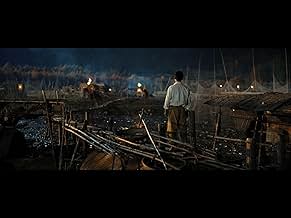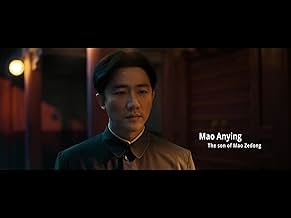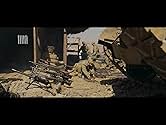CALIFICACIÓN DE IMDb
5.5/10
4.6 k
TU CALIFICACIÓN
Una batalla épica de hace 71 años, cuando el Ejército Popular de Voluntarios entró en Corea del Norte. En condiciones extremas de frío, las tropas en el frente oriental lucharon, con espírit... Leer todoUna batalla épica de hace 71 años, cuando el Ejército Popular de Voluntarios entró en Corea del Norte. En condiciones extremas de frío, las tropas en el frente oriental lucharon, con espíritu intrépido y voluntad de hierro.Una batalla épica de hace 71 años, cuando el Ejército Popular de Voluntarios entró en Corea del Norte. En condiciones extremas de frío, las tropas en el frente oriental lucharon, con espíritu intrépido y voluntad de hierro.
- Premios
- 37 premios ganados y 40 nominaciones en total
Opiniones destacadas
All those 1-star review bombs are exposing the current climate of McCarthyist sinophobic hysteria in the west pretty accurately.
For anyone not suffering from McCarthyist hysteria, this is a decent movie with well-crafted, tense, and dramatic action scenes. It also does it's job of illustrating the theme of ordinary people being capable of extraordinary heroics feats and self-sacrifice when under existential threat.
Also, a good choice to feature Mao Anying's participation and death in the narrative. It showcases that the social class he was born in as Mao Zedong's son mattered nothing, because death is equal to all when fighting a war.
Less well done were the scenes of the American side. The directors and script writers did provide at least a couple of scenes of American soldiers talking about home life, and I thought this was a good choice to provide the American side with some humanity. But the actors were really chewing the scenery here, especially in their line delivery, which was unfortunate. I think, however, that this can mainly be attributed to the fact that these actors are far from being A-listers. Unfortunately, China still has not build up a decent pool of ethnically non-Asian quality actors, so I foresee more of this happening in the future.
Now a bit of historical context here on China's motives for partaking in this war: A few decades before the Korean War, China had been brutally invaded by imperial Japan through the Korean peninsula, which started off the theater of WW2 in the Far East. Given that this history was still fresh in the minds of the Chinese at the time, China was very sensitive to any happenings on the Korean peninsula. For that reason, they warned the American side multiple times not to cross the 38th parallel or they would force China's hand. The Americans thought the Chinese were bluffing and crossed that line anyway. This (and the American fleets that had gone to the Taiwan Straits in the summer of 1950) convinced the Chinese that the USA would try to invade and colonize China after taking control of the Korean peninsula. To preemptively stop this threat, China decided to set up the People's Volunteer Army to defend against the existential threat.
For anyone not suffering from McCarthyist hysteria, this is a decent movie with well-crafted, tense, and dramatic action scenes. It also does it's job of illustrating the theme of ordinary people being capable of extraordinary heroics feats and self-sacrifice when under existential threat.
Also, a good choice to feature Mao Anying's participation and death in the narrative. It showcases that the social class he was born in as Mao Zedong's son mattered nothing, because death is equal to all when fighting a war.
Less well done were the scenes of the American side. The directors and script writers did provide at least a couple of scenes of American soldiers talking about home life, and I thought this was a good choice to provide the American side with some humanity. But the actors were really chewing the scenery here, especially in their line delivery, which was unfortunate. I think, however, that this can mainly be attributed to the fact that these actors are far from being A-listers. Unfortunately, China still has not build up a decent pool of ethnically non-Asian quality actors, so I foresee more of this happening in the future.
Now a bit of historical context here on China's motives for partaking in this war: A few decades before the Korean War, China had been brutally invaded by imperial Japan through the Korean peninsula, which started off the theater of WW2 in the Far East. Given that this history was still fresh in the minds of the Chinese at the time, China was very sensitive to any happenings on the Korean peninsula. For that reason, they warned the American side multiple times not to cross the 38th parallel or they would force China's hand. The Americans thought the Chinese were bluffing and crossed that line anyway. This (and the American fleets that had gone to the Taiwan Straits in the summer of 1950) convinced the Chinese that the USA would try to invade and colonize China after taking control of the Korean peninsula. To preemptively stop this threat, China decided to set up the People's Volunteer Army to defend against the existential threat.
For a war movie, it is not bad, at least have some plots. The sad truth is that there is no winner in this war, that's why it's dragged for three years and no one can claim to be the winner. But since it's a movie, not a documentary, I don't think we need to discuss the truth or fiction here. However, many reviews are anti-China, I highly doubt those people ever watched the actual movie.
As a Chinese, I don't like this movie at all. This movie is kind of typical of Hollywood.
It's not a good movie to tell the history of the battle of Lake Changjin or the history of the war to resist U. S. aggression in Korea.
The movie didn't tell clearly that before Chinese army attended the war, the U. S. Navy's seventh Fleet had sailed into the Taiwan Strait on the orders of President Harry Truman. At that time, both Chinese government and Chinese people didn't want to attend a war again. But we have no choice.
The movie seems to blame MacArthur for all these faults. But at that time, the U. S. government itself also supported attacking NORTH Korea and even China. China warned the US not to cross the 38th parallel, but the government's leader Truman ignored it and thought China wouldn't send troops. These weren't made clear in the movie.
How the Chinese generals direct their soldiers to fight were not shown clearly in the movie. How the Chinese solders used wisdom and courage to defensed the tanks were not shown clearly in the movie either. They even let the main character use another tank to defense. That cannot be true.
Even at the end, the director arranged for American officers to salute the dead Bodies of Chinese soldiers. I'm not sure wether an ordinary soldier would do it, but I'm quite sure those who led the armies to attack Chinese People's Volunteers would not. It's really ridiculous.
The story about Lei was really great. He knew how to lead the soldiers to defense with wisdom, he knew to take advantage of the terrain, he also knew a soldier's sacrifice needs to be worth it. I cried when he died, especially when I heard the song of Yimeng. The Chinese sacrificed a lot in the war of liberation but now they need to fight again, to fight against the US army.
Who started the war first? Who amplified the war first? Who is invading? OF COURSE, not China.
Some people may think, the film is a propaganda tool for the Chinese government. This is ridiculous. This movie didn't even tell the history of the battle of Lake Changjin in a good way. Can it be propaganda? It wasn't nearly as much propaganda as Transformers, which showed off the U. S. military.
Do not assume every Chinese film as a propaganda tool, to be honest, the Chinese directors weren't good at propagating politics as American directors.
It's not a good movie to tell the history of the battle of Lake Changjin or the history of the war to resist U. S. aggression in Korea.
The movie didn't tell clearly that before Chinese army attended the war, the U. S. Navy's seventh Fleet had sailed into the Taiwan Strait on the orders of President Harry Truman. At that time, both Chinese government and Chinese people didn't want to attend a war again. But we have no choice.
The movie seems to blame MacArthur for all these faults. But at that time, the U. S. government itself also supported attacking NORTH Korea and even China. China warned the US not to cross the 38th parallel, but the government's leader Truman ignored it and thought China wouldn't send troops. These weren't made clear in the movie.
How the Chinese generals direct their soldiers to fight were not shown clearly in the movie. How the Chinese solders used wisdom and courage to defensed the tanks were not shown clearly in the movie either. They even let the main character use another tank to defense. That cannot be true.
Even at the end, the director arranged for American officers to salute the dead Bodies of Chinese soldiers. I'm not sure wether an ordinary soldier would do it, but I'm quite sure those who led the armies to attack Chinese People's Volunteers would not. It's really ridiculous.
The story about Lei was really great. He knew how to lead the soldiers to defense with wisdom, he knew to take advantage of the terrain, he also knew a soldier's sacrifice needs to be worth it. I cried when he died, especially when I heard the song of Yimeng. The Chinese sacrificed a lot in the war of liberation but now they need to fight again, to fight against the US army.
Who started the war first? Who amplified the war first? Who is invading? OF COURSE, not China.
Some people may think, the film is a propaganda tool for the Chinese government. This is ridiculous. This movie didn't even tell the history of the battle of Lake Changjin in a good way. Can it be propaganda? It wasn't nearly as much propaganda as Transformers, which showed off the U. S. military.
Do not assume every Chinese film as a propaganda tool, to be honest, the Chinese directors weren't good at propagating politics as American directors.
This is just an expensive imitation of the great war movies like Save Private Ryan. The problem is, unlike in Save Private Ryan, the Chinese directors and actors did not show the war as human tragedies, where countless young lives were lost. They presented the battles as glorious, heroic and patriotic acts. This just show the mindset of the Chinese elites nowadays.
The movie did not demonise the US troops. That's an improvement. However the US officers and soldiers characters are just like movie props, with little personalities or emotions. I don't know if this is because they can't get good US actors, or because they don't want US soldiers look more humane than the Chinese.
The movie showed the huge loss to the Chinese army only in numbers, when casualties were reported by the soldiers. But the fighting scene predominately shows US soldiers got blown up into the sky, with very few scenes showing Chinese soldiers getting killed. This is the same old practices of the Chinese war movies, showing how brave and effective killing machine the Chinese army is.
For the westerners who generally do not know what happened in Korean War, and what kind of soldiers were sent over to fight. Here is a fact to ponder: a large portion of Chinese POWs refused to go back to China and were sent to Taiwan.
The movie did not demonise the US troops. That's an improvement. However the US officers and soldiers characters are just like movie props, with little personalities or emotions. I don't know if this is because they can't get good US actors, or because they don't want US soldiers look more humane than the Chinese.
The movie showed the huge loss to the Chinese army only in numbers, when casualties were reported by the soldiers. But the fighting scene predominately shows US soldiers got blown up into the sky, with very few scenes showing Chinese soldiers getting killed. This is the same old practices of the Chinese war movies, showing how brave and effective killing machine the Chinese army is.
For the westerners who generally do not know what happened in Korean War, and what kind of soldiers were sent over to fight. Here is a fact to ponder: a large portion of Chinese POWs refused to go back to China and were sent to Taiwan.
Commissioned by the Chinese Communist Party to commemorate their 100th anniversary, The Battle at Lake Changjin pours an entire nation's jingoistic fervour, anti-US sentiments, blatant propaganda & more into a 3-hour long war film that's no different from majority of Hollywood war films in its fact distortion & history revision but it's a tad too simplistic & predictable to deliver on the storytelling front.
Directed by Chen Kaige, Tsui Hark & Dante Lam, the story is a fictionalised retelling of the battle that unfolded between Chinese soldiers & American troops during the Korean War and is crafted in a manner that's meant to provoke nationalistic pride in its intended audience. While the first hour is uneventful, things do get better once the battle is on and the film does well to make sure the interest isn't entirely lost from thereon.
The mass battle sequences do deliver the goods but only when it's being waged in close-proximity. Still, for a $200 million production, the CGI is an absolute cringe and prevents several scenes from making their desired impact. Further weakening the ride is the narrative approach, awful dialogues, cardboard characters, excessive runtime, repetitive action, weak performances & overdone sentimentality. It is a state-sponsored picture and it shows.
Overall, The Battle at Lake Changjin has moments of spectacle and the swift pans & camera manoeuvres add the necessary cinematic touches to its action sequences but there is a lot in here that could've been further improved. The caricature depiction of US forces isn't really a complaint since most American war films do the same. However, the extreme flag-waving on display is so forceful & overpowering that it often kills the film's unabashedly entertaining aspects.
Directed by Chen Kaige, Tsui Hark & Dante Lam, the story is a fictionalised retelling of the battle that unfolded between Chinese soldiers & American troops during the Korean War and is crafted in a manner that's meant to provoke nationalistic pride in its intended audience. While the first hour is uneventful, things do get better once the battle is on and the film does well to make sure the interest isn't entirely lost from thereon.
The mass battle sequences do deliver the goods but only when it's being waged in close-proximity. Still, for a $200 million production, the CGI is an absolute cringe and prevents several scenes from making their desired impact. Further weakening the ride is the narrative approach, awful dialogues, cardboard characters, excessive runtime, repetitive action, weak performances & overdone sentimentality. It is a state-sponsored picture and it shows.
Overall, The Battle at Lake Changjin has moments of spectacle and the swift pans & camera manoeuvres add the necessary cinematic touches to its action sequences but there is a lot in here that could've been further improved. The caricature depiction of US forces isn't really a complaint since most American war films do the same. However, the extreme flag-waving on display is so forceful & overpowering that it often kills the film's unabashedly entertaining aspects.
¿Sabías que…?
- TriviaUntil the last week of 2021, the highest-grossing film of the year and the highest-grossing film in Chinese cinema history as of 2021.
- ConexionesFeatured in Zomergasten: Garrie van Pinxteren (2024)
Selecciones populares
Inicia sesión para calificar y agrega a la lista de videos para obtener recomendaciones personalizadas
- How long is The Battle at Lake Changjin?Con tecnología de Alexa
Detalles
Taquilla
- Presupuesto
- USD 200,000,000 (estimado)
- Total en EE. UU. y Canadá
- USD 342,411
- Fin de semana de estreno en EE. UU. y Canadá
- USD 105,768
- 21 nov 2021
- Total a nivel mundial
- USD 902,548,476
- Tiempo de ejecución2 horas 56 minutos
- Color
- Mezcla de sonido
- Relación de aspecto
- 2.39 : 1
Contribuir a esta página
Sugiere una edición o agrega el contenido que falta

Principales brechas de datos
What is the German language plot outline for Batalla En El Lago Changjin (2021)?
Responda


































